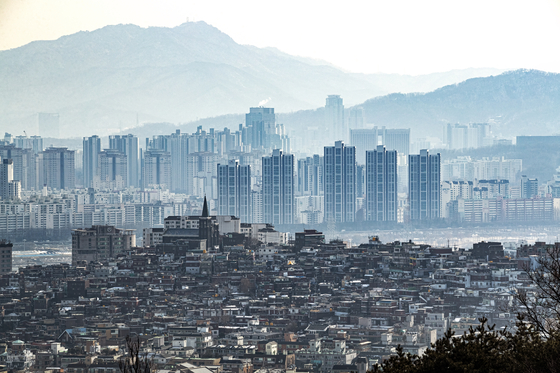
Seoul Gangnam and Gangbuk. Jamwon-dong apartment complex overlooking Hannam-dong residential area. This photo has nothing to do with the article. Reporter Jeon Min-gyu
‘The apartment is all built, but why not disband the union?’
The city of Seoul is entering into the first Japanese imperial investigation on the redevelopment/reconstruction association. The subject is 63 unions that have not been disbanded even after the apartments have been built.
The Seoul Metropolitan Government announced on the 9th that “a Japanese colonial investigation will be conducted on 63 unions in Seoul that have not disbanded for more than a year since completion.” If a union is established for reconstruction and redevelopment and then disbanded, the project cost cannot be liquidated, and members can suffer financial damage from additional contributions or lawsuits.
16 places with more than 10 years of delay
According to the Seoul Metropolitan Government, 16 of the 63 sites that were surveyed by Japanese colonization were found to have delayed dissolution of unions for more than 10 years. Twenty are not disbanding for lawsuits.
The Seoul Metropolitan Government said, “Some cooperatives are not dissolving the cooperatives even though the apartments are completely built and occupied,” and “For this reason, members are suffering financial damage from additional contributions or litigation costs, rather than liquidating project costs.”
The Seoul Metropolitan Government also mentioned the discovery of useful cases by the union president. It was before the Japanese colonial investigation, but it means that there are already problematic combinations. The Seoul Metropolitan Government said, “There have also been cases of deliberate delays in dissolution for several years, even when the union leader privately used the remaining union operating expenses or filed unnecessary lawsuits in order to maintain the status of the union leader.”
This Japanese imperial investigation will be conducted based on the revised ordinance in 2019. The city of Seoul has reflected in this ordinance what it can recommend to the head of the autonomous district to select a professional union manager for the liquidation and dissolution of the union. The ordinance was revised on the grounds that only the procedure for dissolution and liquidation of the union is contained in the current law, and there is no regulation on how long it must be dissolved, resulting in unnecessary conflict.

Seoul Jung-gu, Seoul City Hall. News 1
Seoul “I will help with dissolution and liquidation of the union”
The Japanese colonial investigation begins on the 15th. First, a preliminary investigation is conducted through relevant documents for each ward office, and a second investigation is conducted for unions that require close investigation. On-site inspections are also conducted by employing a joint inspection team composed of public officials, lawyers and accountants at Seoul City and Gu offices. If illegal matters are discovered, it will also request an investigation.
Seong-bo Kim, head of the Seoul Housing and Architecture Headquarters, said, “This investigation is the first step to block corruption that may occur due to union dissolution and minimize damage to members.” .
Reporter Kim Hyun-ye [email protected]
![]()
